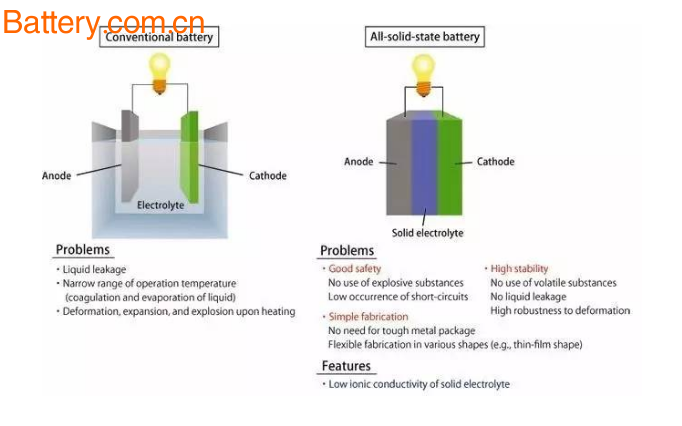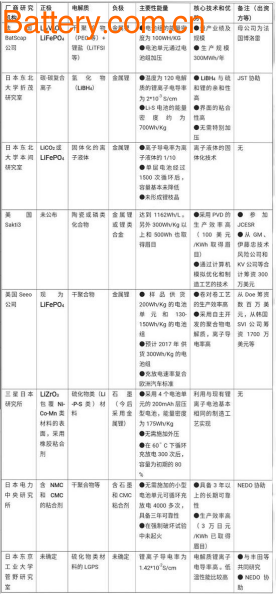Lithium battery safety has always been a concern of the industry. As the requirements of the application and policy layers continue to increase in energy density, the trend of ternary batteries becoming the mainstream technology route is irreversible. But today, the safety of the ternary battery is still not well solved. Even the best known Tesla in the world is BMS. It is also a constant safety accident. In 2017, only two Model Ss occurred in China. In the event of a serious fire, the safety of the ternary battery is still being questioned by everyone.
Faced with the pain of industry development, industry experts and enterprises are constantly looking for new development ideas. Electrolyte is one of the ideas. It is well known lithium ion battery electrolyte is an indispensable component of the lithium ion battery is obtained the advantages of high voltage, high cycle performance prerequisites. Lithium-ion batteries usually use an organic solvent as an electrolyte, and such organic solvents are extremely flammable. Once the battery generates a high temperature or a spark due to an internal short circuit, the electrolyte will be ignited in an instant and cause the entire battery to explode. The new idea is to turn a flammable liquid electrolyte into a solid electrolyte, reducing the safety risks caused by flammability and achieving better performance. With the development of new energy vehicles, high energy density, high security batteries have become the market's goal. Some experts believe that the use of solid electrolytes to replace traditional electrolytes is the only way to enhance the safety of lithium batteries .
Wang Yan (transliteration) and professor of materials and engineering at the Massachusetts Institute of Technology, Gebrandd Sedar, said that solid electrolytes would be "a true game-changer" that would create a perfect battery— —Solid electrolyte batteries solve most of the problems faced by lithium-ion batteries today, achieving an optimal balance between battery life, safety and cost.
So what is the charm of a solid electrolyte battery?
Beijing Institute of Technology National Engineering Laboratory electric vehicles, members of the China Electrotechnical Society of Professional Committee of electric vehicles has said that Sun Liqing, a solid-state electrolyte battery will be the next outlet, is the main development trends of new energy battery. Compared with traditional lithium batteries, the difference in solid-state lithium batteries lies in the solidification of electrolytes, which theoretically has certain advantages.

The picture shows the solid electrolyte schematic
High security performance. Since the liquid electrolyte contains a flammable organic solution, it is prone to combustion and explosion when the short-circuit temperature rises suddenly, and it is necessary to install a safety device structure resistant to temperature rise and short circuit. The solid electrolyte is non-flammable, non-corrosive, non-volatile, and has no leakage problems, and also overcomes the phenomenon of lithium dendrite, so the all-solid battery has extremely high safety.
High energy density. At present, the energy density of lithium batteries used in the market is 200Wh/kg. If solid electrolyte is used, the energy density of lithium batteries can reach 300-400Wh/kg, almost doubled.
Relatively light. A solid electrolyte battery is relatively light compared to a liquid battery, a battery pack of the same capacity. For example, the quality of the ternary lithium battery pack produced by Tesla-Panasonic is 900kg, while the quality of the same capacity battery pack produced by solid-state battery startup Seeo Inc is only 323kg, which is close to one-third of the former.
High cycle performance. The solid electrolyte solves the problem of the solid electrolyte interface film formed by the liquid electrolyte during charge and discharge and the lithium dendrite phenomenon, which greatly improves the cycle and service life of the lithium battery. Ideally, the cycle performance is excellent, and can reach about 45,000 times. .
While solid electrolytes have advantages, they also have certain disadvantages, which is the main reason for the commercialization of solid electrolyte batteries.

The picture shows the structure of the all-solid lithium battery and the battery performance.
The interface impedance is too large. Compared with the traditional lithium battery, the solid-solid interface of the solid electrolyte battery has weak contact between the electrode and the electrolyte, and the low transmission kinetics of ions in the solid matter. In order to avoid high interface impedance due to the space charge layer, Experts continue to experiment and expect to break through as soon as possible.
Fast charging is more difficult. The solid-state electrolyte battery has a low-rate LiPON series battery (in fact, the electrolyte system generally has poor general rate performance), and can also make a high-rate solid-state lithium-sulfur battery based on a sulfur-based high-performance electrolyte. However, in general, as a power source, solid electrolyte batteries still have many challenges in terms of high rate performance.
The cost price is high. It is understood that the liquid electrolyte lithium battery cost around $ 200-300 / kWh, if using existing technology to produce enough power for smart phones of solid electrolyte battery, the cost will reach $ 150 million, while solid enough to power the car The cost of electrolyte batteries is even more impressive at $90 million.
In fact, solid electrolyte batteries are not new. Academician Chen Liquan of the Chinese Academy of Engineering once said that if the entire solid-state battery is not yet deployed, it will miss the opportunity for development. Enterprises are optimistic about the prospects of solid-state batteries, and they are laid out. As early as 2010, Toyota has been quietly exploring the field of solid-state batteries. However, it has not improved, until the solid-state battery patent submitted to the US Patent Office in December 2016 was finally approved, winning the headlines of the major pages.
According to the Toyota Solid State Battery patent application published by the US Patent Office, the electrolyte of the solid-state battery developed by Toyota is composed of a solidified electrolyte material containing lithium, phosphorus, sulfur and iodine, and a special phosphate ester is added to the electrode active material layer. Improves the thermal stability of the battery.
Advances in technology and materials have enabled more and more institutions and enterprises at home and abroad to see the bright future of solid-state batteries, and have invested in the research and development and production of solid-state batteries. Foreign countries have started early in this field and have achieved certain results. The results are as follows:

As can be seen from the above table, the focus on solid-state batteries is not limited to foreign institutions, but also includes many domestic institutions. At present, domestic institutions engaged in solid-state battery research mainly include the Institute of Chemistry of the Chinese Academy of Sciences, the Qingdao Energy Institute of the Chinese Academy of Sciences, the Ningbo Institute of Materials of the Chinese Academy of Sciences, the Ningde era, the AVIC Lithium, the Weiwei Shares, the Hengdian East Magnetic, and the Taiwan Huineng. These companies have also made certain breakthroughs, as follows:
Wei Wei: On November 15, 2016, Weiwei Co., Ltd. released the world's first solid-state lithium battery and fast-charged lithium battery in Shanghai. At the same time, it said that it will fully accelerate the combination of solid-state lithium battery and fast-charge lithium battery. Layer security and super performance are combined into one.
Ningde era: Guo Yongsheng, R&D manager of Ningde era, said that Ningde era is actively deploying the next generation technology of power battery, and has invested more in the research and development of solid-state lithium batteries, and is also developing the manufacturing process of solid-state batteries.
In addition, Hengdian East Magnetic also said that it will organize the development of solid-state batteries.
As one of the future battery technology directions, solid electrolytes have a long way to go in terms of electrolyte materials, cost and process. However, in the face of its huge commercial value space, there will be more battery industry chain companies. . With the promotion and deepening of R&D technology, the pace of industrialization of solid-state batteries will be closer to us.
Ningbo Jingcheng Technology Co., Ltd. is a professional Mechanical Heat Meters manufacturer.
Jingcheng Heat Meters are measuring devices for a precise consumption metering. For measuring the heat which, in a heat-exchange circuit, is absorbed or given up by water called the heat-conveying liquid.From the start, we have developed innovative products based on the technology in dialogue with our customers. The result is a collection of well-engineered measuring instruments proved time and again in practice, because exact consumption values are only possible with precise measuring technology.
Please feel free to contact us if you need any Mechanical Heat Meters.
Jet Water Meter,Mechanical Heat Meter,Vane Wheel Water Meter,Multi Jet Water Meter
Ningbo Jingcheng Technology Co., Ltd. , https://www.jingchengmeter.com